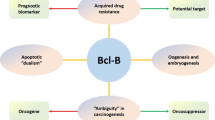Abstract
Bcl-2 family proteins serve as critical regulators of pathways involved in apoptosis, acting to either inhibit or promote cell death. Altered expression of these proteins occurs commonly in human cancers, contributing to neoplastic cell expansion by suppressing programmed cell death and extending tumor cell life span. Moreover, because chemotherapeutic drugs typically exert their cytotoxic actions by inducing apoptosis, the ultimate efficacy of most anticancer drugs can be heavily influenced by the relative levels and state of activation of members of the Bcl-2 family. The question of how Bcl-2 family proteins function remains debatable, but new findings are shaping our impressions of these multi-functional proteins and revealing the details of how these proteins participate in the regulation of cell life and death.
Similar content being viewed by others
Author information
Authors and Affiliations
Rights and permissions
About this article
Cite this article
Reed, J. Bcl-2 family proteins. Oncogene 17, 3225–3236 (1998). https://doi.org/10.1038/sj.onc.1202591
Published:
Issue Date:
DOI: https://doi.org/10.1038/sj.onc.1202591
- Springer Nature Limited
Keywords
This article is cited by
-
MicroRNAs as the critical regulators of autophagy-mediated cisplatin response in tumor cells
Cancer Cell International (2023)
-
FTO protects human granulosa cells from chemotherapy-induced cytotoxicity
Reproductive Biology and Endocrinology (2022)
-
Mining prognostic markers of Asian hepatocellular carcinoma patients based on the apoptosis-related genes
BMC Cancer (2021)
-
Identification of abnormally methylated–differentially expressed genes and pathways in osteoarthritis: a comprehensive bioinformatic study
Clinical Rheumatology (2021)
-
The effect of bee bread (Perga) with chemotherapy on MDA-MB-231 cells
Molecular Biology Reports (2021)




